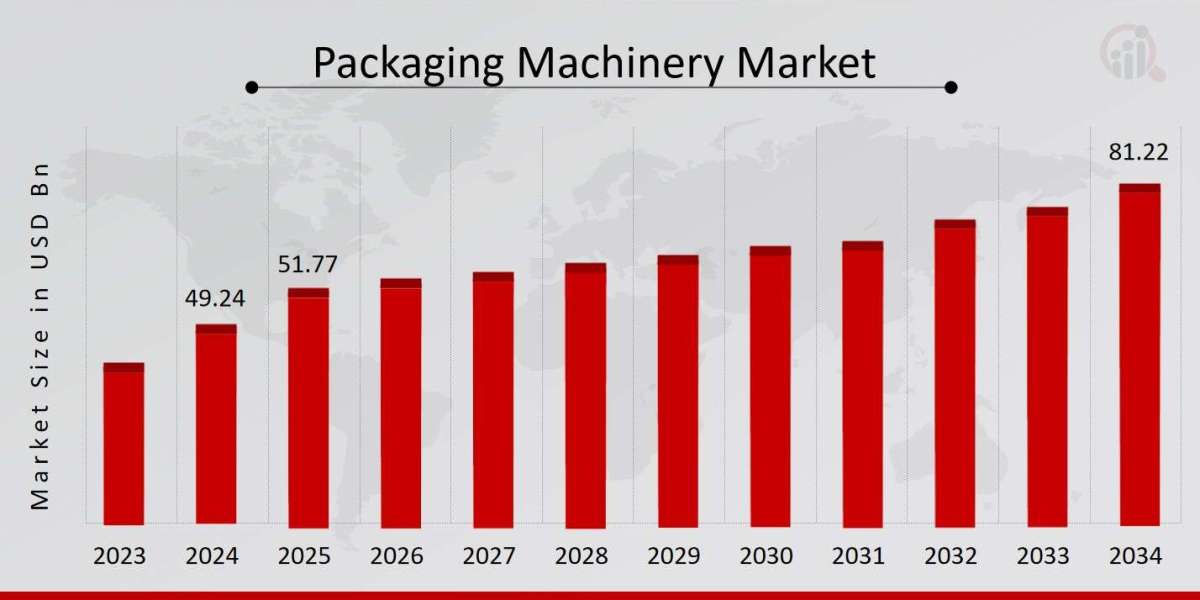The packaging machinery market has become one of the most dynamic and transformative industries across the globe, playing a crucial role in how products are delivered, stored, and consumed. In recent years, packaging has shifted far beyond the basic function of enclosing goods; it has evolved into a combination of safety, convenience, efficiency, and branding. As industries expand and consumer expectations rise, the machinery that powers modern packaging lines has undergone significant innovation, making the packaging machinery market an essential driver of industrial progress.
At its core, packaging machinery is designed to improve efficiency in the preparation of products for distribution, handling, and sale. This includes a wide array of machines such as filling systems, sealing equipment, labeling machines, cartoning lines, palletizing units, and wrapping technologies. These machines are not only about speed but also about ensuring precision, reducing product waste, and maintaining consistent quality. Over time, the market has diversified into serving multiple industries including food and beverages, pharmaceuticals, cosmetics, personal care, chemicals, consumer goods, and e-commerce. Each of these sectors brings its own set of demands, which has encouraged manufacturers of packaging machinery to continually adapt and innovate.
The food and beverage industry remains one of the largest consumers of packaging machinery. With global demand for ready-to-eat meals, frozen products, and beverages packaged in cans, bottles, and cartons, companies are increasingly relying on machines that can handle mass production without compromising safety standards. Hygiene and contamination-free processing are critical, so advanced machinery now incorporates technologies such as automated cleaning systems, sterile sealing methods, and intelligent sensors that monitor each stage of packaging. Moreover, the trend of portion control, single-serve packaging, and sustainable packaging materials is influencing the kind of machines companies choose to invest in.
Similarly, the pharmaceutical sector places immense pressure on packaging machinery. Here, accuracy and traceability are paramount. Blister packaging machines, strip packagers, and labeling systems ensure that every unit of medicine is sealed, coded, and traceable. With the rise of global health awareness, vaccines, and personalized medicine, the demand for sophisticated pharmaceutical packaging machines has increased dramatically. Tamper-evident seals, anti-counterfeiting technologies, and serialization systems are becoming standard features, allowing regulatory compliance and patient safety to align seamlessly with production efficiency.
Another major driver of the packaging machinery market is the growth of e-commerce and logistics. As consumers purchase products online at an unprecedented pace, packaging machinery must support a wide variety of product dimensions, durability requirements, and protective packaging solutions. From automated box-making systems to robotic palletizers that optimize warehouse space, machinery is increasingly designed to handle the flexible demands of online retail. Speed and adaptability define this segment, since companies cannot afford delays in fulfilling large volumes of orders.
Automation and digital transformation are perhaps the most defining trends shaping the modern packaging machinery market. Traditional manual processes are being replaced with robotic arms, machine vision systems, and artificial intelligence-powered quality checks. Smart packaging machines are now equipped with sensors that track production data, monitor wear and tear, and enable predictive maintenance. This ensures minimal downtime and higher efficiency. In addition, the integration of the Internet of Things (IoT) allows real-time data sharing, enabling manufacturers to make informed decisions and optimize their production lines. For companies operating on thin margins, these advancements provide both cost savings and a competitive edge.
Sustainability is another major force reshaping the landscape of the packaging machinery industry. Consumers are becoming increasingly conscious of the environmental impact of packaging, leading companies to seek machines that can process recyclable, compostable, or biodegradable materials. From paper-based flexible packaging to plant-based plastics, machinery is being adapted to handle alternative substrates that are eco-friendly yet durable. Energy-efficient machines, reduced material wastage, and systems that optimize packaging dimensions also contribute to sustainability goals. Manufacturers of packaging machinery are therefore under pressure not only to innovate but to innovate responsibly.
Regionally, the packaging machinery market reflects varying dynamics. Developed economies often demand high-end, technologically advanced equipment to meet regulatory and consumer expectations. Meanwhile, emerging markets are experiencing rapid industrialization and urbanization, which drives the need for cost-effective machinery that can meet rising domestic consumption. The globalization of supply chains has further intensified competition, with companies striving to balance affordability, speed, and innovation in their packaging operations.
The competitive landscape of the packaging machinery market is characterized by continuous research, product launches, and strategic partnerships. Companies are investing in modular machinery that can be customized to specific needs and scaled as businesses grow. Flexibility is key, as manufacturers must cater to diverse packaging sizes, product varieties, and industry-specific requirements. Moreover, after-sales services such as maintenance, spare parts supply, and operator training have become vital to sustaining long-term client relationships in this sector.



